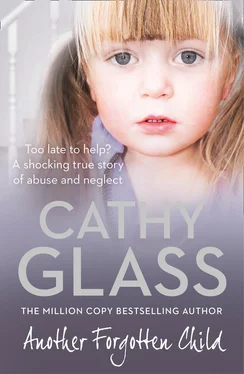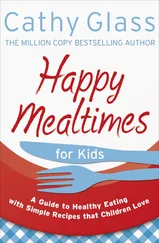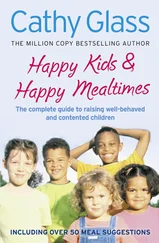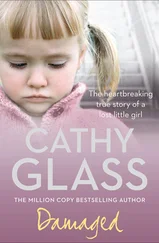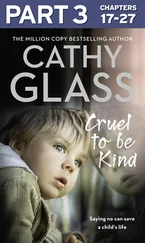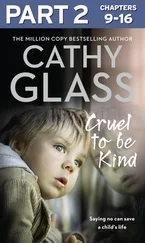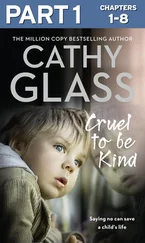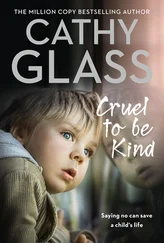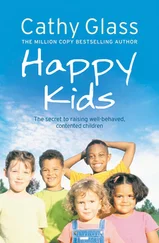A Challenge Contents Cover Title Page Copyright Chapter One: The Child from Hell Chapter Two: Awaiting Aimee Chapter Three: A Challenge Chapter Four: ‘I Want Biscuits’ Chapter Five: Severe Neglect Chapter Six: ‘I’ll Tell Me Mum!’ Chapter Seven: Should Have Done More Chapter Eight: Meeting Susan Chapter Nine: ‘He’s Horrible’ Chapter Ten: Poor Role Models Chapter Eleven: The Phone Call Chapter Twelve: Craig Chapter Thirteen: More Trouble Chapter Fourteen: Keep Asking Chapter Fifteen: Quiet and Withdrawn Chapter Sixteen: Serious Allegation Chapter Seventeen: Problem Family Chapter Eighteen: Flashback Chapter Nineteen: Hatchet Chapter Twenty: ‘Father Christmas Didn’t Come to My House’ Chapter Twenty-One: Going for Gold Chapter Twenty-Two: Perfect Christmas Chapter Twenty-Three: A New Year Chapter Twenty-Four: Jason Chapter Twenty-Five: A Winner Now Chapter Twenty-Six: Progress Chapter Twenty-Seven: A Chance Meeting Chapter Twenty-Eight: Peter Rabbit Chapter Twenty-Nine: The Visit Chapter Thirty: An Incredible Family Epilogue Acknowledgements Exclusive sample chapter Cathy Glass About the Publisher
Despite all the years I’d been fostering I still felt nervous when anticipating the arrival of a new child. Will the child like me? Will I be able to help the child come to terms with their suffering and separation from home? Will I be able to cope with the child’s needs? Or will this be the one child I can’t help? Once the child arrives there is so much to do that there isn’t time for worrying, and I simply get on with it. But on that Thursday afternoon while I waited for Aimee to arrive, which I calculated would be between 4.30 and 5.00 p.m., my stomach churned, and all manner of thoughts plagued me so that I couldn’t settle to anything. Jill had phoned to say she’d been called to an emergency so wouldn’t be able to be with me for moral support when Aimee was placed. I’d reassured her I’d be all right.
Paula arrived home from school at four o’clock and, having had a drink and a snack, went to her room to unwind before starting her homework; Lucy wouldn’t be home until about 5.30. My anxieties increased until at 4.40 the doorbell rang. With a mixture of trepidation and relief that Aimee had finally arrived, I went to answer it.
‘Hello,’ I said brightly, with a big smile that belied my nerves. ‘Good to see you.’ There were two social workers, whom I took to be Kristen and her colleague Laura, and they stood either side of Aimee, who carried a plastic carrier bag. ‘I’m Cathy. Do come in.’ I smiled.
It was clear who thought she was in charge, for, elbowing the social workers out of the way, Aimee stepped confidently into the hall and then stood looking at me expectantly.
The social workers followed. ‘Hello, Cathy,’ they said and introduced themselves.
‘Shall we leave our shoes here?’ Kristen said thoughtfully, slipping off her shoes, having seen ours paired in the hall.
‘Thank you,’ I said. ‘And I’ll hang your coats on the hall stand.’
As Kristen and Laura took off their shoes and coats I looked at Aimee, who was doing neither. ‘Shall we leave your shoes and coat here?’ I said encouragingly.
‘No. Not taking ’em off,’ Aimee said, jutting out her chin in defiance. ‘And you can’t make me.’ My fault, I thought, for giving her a choice. What I should have said was: ‘Would you like to take off your coat first or your shoes?’ It’s a technique called ‘the closed choice’ and would have resulted in action rather than refusal.
‘No problem,’ I said easily. ‘You can do it later.’
‘Not taking ’em off at all,’ Aimee said challengingly. The two social workers looked at me and then raised their eyes.
‘You can keep your shoes and coat on for now,’ I said, aware I needed to be seen to be in charge. ‘And we’ll take them off later. Come on through.’ Before Aimee could give me another refusal I turned and led the way down the hall and into the sitting room. My thoughts went again to Jodie. Although Aimee was the same age as Jodie, with similar blonde hair and grey-blue eyes, she wasn’t so badly overweight and also seemed more astute. I knew I would need my wits about me in order to gain her cooperation.
In the sitting room Aimee plonked herself in the middle of the sofa, which left the two social workers to squeeze themselves in either side of her. ‘This is nice,’ Aimee said, running her eyes around the room. ‘It ain’t like this at my house. My ’ouse is a pigsty.’ I smiled sadly at her heartfelt and innocent comparison – she was simply stating it as she saw it.
‘No,’ Kristen agreed, seizing the chance to demonstrate what an improvement coming into care was. ‘Cathy’s house is clean and warm and has lots of nice furniture. You’ll have your own room here – we’ll see it soon. And there’ll always be plenty of food and hot water.’ All of which I assumed had been missing from Aimee’s house.
‘It’s nice, but it ain’t me home,’ Aimee said.
‘It will be for now,’ Laura put in.
‘No it won’t,’ Aimee said, louder, turning to Laura and jutting out her chin. ‘Me home’s with me mother and neither you nor your bleeding lawyers can change that.’
Kristen and Laura both looked at me. ‘I can guess where that’s come from,’ Kristen said. I nodded. It was a phrase an adult would have used, not an eight-year-old child, so I assumed Aimee was repeating something her mother had said.
‘Cathy will be taking you to school and collecting you,’ Kristen continued, unperturbed. ‘And tomorrow you’ll be able to see your mother after school.’ Then, looking at me, Kristen said: ‘I’ll speak to you later about contact arrangements.’
‘OK,’ I said. Then I offered them a drink, as I hadn’t done so before.
‘No, I’m fine, thanks,’ Kristen said. ‘We’ll settle Aimee and then get back to the office.’ Laura agreed.
‘What about you, Aimee?’ I said. ‘Would you like a drink?’
She shook her head, more interested in the objects in the room, which she was gazing at in awe, like a child in a toyshop. My sitting room was nothing special, but it clearly was to Aimee, who seemed mesmerized by the framed photographs on the walls, the potted plants, ornaments, etc. like those that adorn most sitting rooms.
‘Aimee has one bag with her,’ Kristen said. ‘It’s in the hall.’ I nodded. ‘We’ll try to get some more of her things when Mum has calmed down, but I’m not sure how much use they’ll be.’ I nodded again, as I understood what she meant. If the clothes Aimee wore now were representative of the rest of her clothes, the others were likely to be suitable for the ragbag. The jacket she’d refused to take off was far too small, dirty and badly worn; the faded black jogging bottoms were too short and badly stained; and her plastic trainers had split at both toes, so that her socks poked through. I couldn’t remember the last time I’d seen a child so poorly dressed.
‘Is she in her school uniform?’ I asked, mindful that Aimee had come to me straight from school.
‘What there is of it,’ Kristen said. ‘You’ll need to buy her a whole new uniform. I’ll arrange for you to have the initial clothing allowance.’ This allowance – approximately £80 – is a payment made to foster carers when a child arrives with nothing and needs a whole new wardrobe. It is often weeks before the money is paid and it only goes some way towards the clothes a child needs, but at least it is something.
‘Thank you,’ I said.
‘Is there somewhere private where we can go to talk?’ Kristen said to me. ‘Laura could stay here with Aimee.’
‘Of course,’ I said, standing. ‘We can go in the front room. There are some games over there,’ I said to Aimee and Laura, pointing to the boxes of games I’d brought in.
Читать дальше
